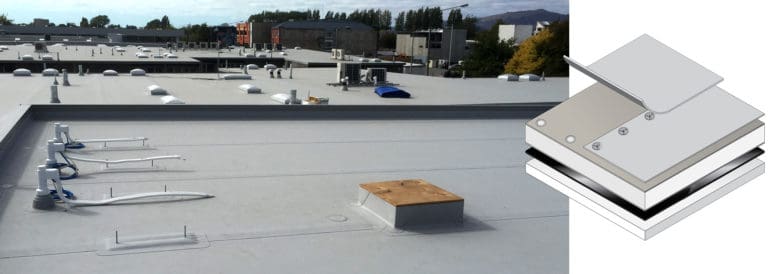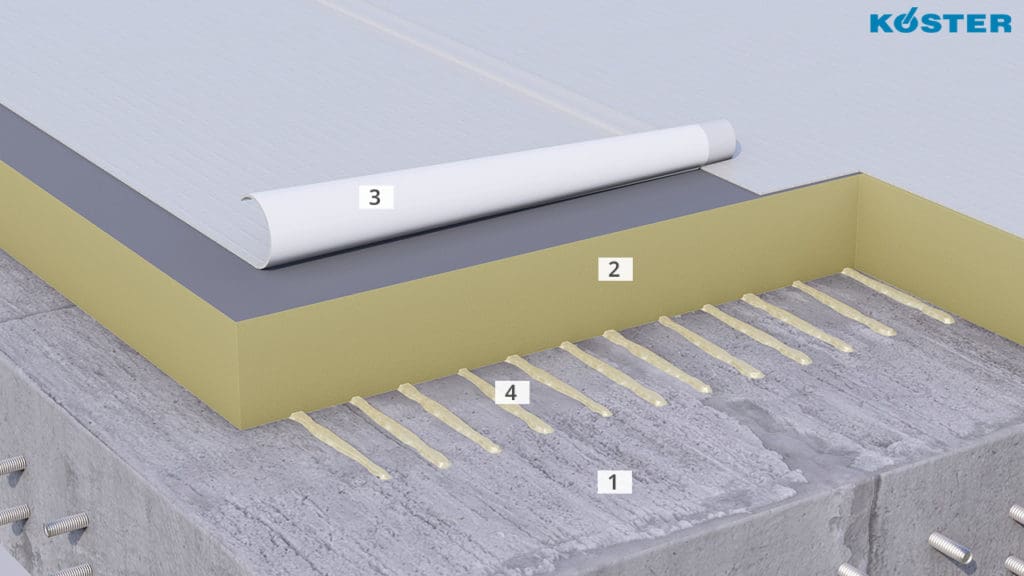You Focus On Business and Leave The TPO Roofing To Us in Greenville, SC
Palmetto Roofers offers comprehensive roof inspections for buildings in South Carolina, assessing potential leaks and determining whether repairs or replacement of TPO roofing components are necessary. As a professional roofing company, we specialize in a range of services, including roof leak diagnosis, commercial roofing in Greenville, SC, roof replacement, and expert installations of new roof systems. Trust our roofing specialists for top-notch commercial roof repair and tailored solutions to meet your roofing needs.
TPO Roofing Greenville, SC

TPO Roofing stands out as a premier choice for flat roofs in commercial buildings, offering a single-ply roofing membrane crafted from synthetic materials and reinforcement. Whether mechanically attached or chemically adhered, it provides a robust protective layer. Produced in film style and available in various widths, TPO membranes offer excellent energy efficiency for commercial roofing. With options like Thermoplastic Polyolefin (TPO) and Ethylene Propylene Diene Terpolymer (EPDM), property owners can choose based on their budget and specific needs, ensuring high-quality roofing solutions for their commercial projects in Greenville, SC.
Other Types of TPO Roofing
Extruded Polystyrene (XPS)
Extruded Polystyrene (XPS) is a noteworthy insulation material frequently employed in TPO roofing systems to bolster energy efficiency and structural resilience. This closed-cell foam insulation is known for its exceptional compressive strength and moisture resistance, making it an ideal choice for enhancing the performance of TPO roofs. XPS insulation contributes to maintaining a consistent temperature within buildings, reducing heating and cooling expenses. With its durability and insulation properties, TPO roofing incorporating Extruded Polystyrene provides property owners with a reliable solution for energy-efficient and well-insulated structures.
Expanded Polystyrene (EPS)
Expanded Polystyrene (EPS) is a type of insulation material utilized in TPO roofing systems to enhance energy efficiency and overall performance. This lightweight, closed-cell foam provides excellent thermal insulation, contributing to temperature regulation and energy savings in buildings. EPS is known for its durability and moisture resistance, making it a reliable choice for TPO roofing projects. By incorporating Expanded Polystyrene into the roofing system, property owners can benefit from enhanced insulation, reducing heating and cooling costs while ensuring a comfortable interior environment. TPO roofing with EPS insulation is a practical solution for those seeking sustainable and effective roofing options.
Extruded Polystyrene (XPS)
Extruded Polystyrene (XPS) is a noteworthy insulation material frequently employed in TPO roofing systems to bolster energy efficiency and structural resilience. This closed-cell foam insulation is known for its exceptional compressive strength and moisture resistance, making it an ideal choice for enhancing the performance of TPO roofs. XPS insulation contributes to maintaining a consistent temperature within buildings, reducing heating and cooling expenses. With its durability and insulation properties, TPO roofing incorporating Extruded Polystyrene provides property owners with a reliable solution for energy-efficient and well-insulated structures.
Expanded Polystyrene (EPS)
Expanded Polystyrene (EPS) is a type of insulation material utilized in TPO roofing systems to enhance energy efficiency and overall performance. This lightweight, closed-cell foam provides excellent thermal insulation, contributing to temperature regulation and energy savings in buildings. EPS is known for its durability and moisture resistance, making it a reliable choice for TPO roofing projects. By incorporating Expanded Polystyrene into the roofing system, property owners can benefit from enhanced insulation, reducing heating and cooling costs while ensuring a comfortable interior environment. TPO roofing with EPS insulation is a practical solution for those seeking sustainable and effective roofing options.
Polyisocyanurate (Polyiso)
Polyisocyanurate (Polyiso) is a type of insulation material commonly used in TPO roofing systems. This rigid foam insulation board adds an extra layer of thermal resistance, enhancing the energy efficiency of TPO roofs. Polyiso provides excellent insulation properties, helping to regulate temperature and reduce energy consumption in buildings. Its versatility and effectiveness make it a popular choice for TPO roofing projects, contributing to the overall performance and durability of the roofing system. Choosing TPO roofing with Polyisocyanurate insulation ensures a reliable solution for property owners looking for energy-efficient and resilient roofing options.

Advantages of TPO Roofing
Client Choice of Insulation
One of the notable advantages of TPO roofing lies in the flexibility it offers to clients in choosing their preferred insulation materials. This client choice of insulation allows property owners to tailor their roofing systems based on specific needs and preferences. Whether opting for Polyisocyanurate (Polyiso), Expanded Polystyrene (EPS), or Extruded Polystyrene (XPS), TPO roofs accommodate various insulation options to enhance energy efficiency and structural performance. This flexibility contributes to the versatility and customization capabilities of TPO roofing systems, making them a popular choice for those seeking tailored solutions for their commercial buildings.
Class A Fire-Rated
TPO roofing stands out for its exceptional fire-resistant properties, often achieving a Class A fire rating. This designation signifies the highest level of fire resistance in roofing materials, emphasizing TPO's ability to inhibit the spread of flames and contribute to overall fire safety. The Class A fire-rated feature makes TPO roofing a preferred choice for commercial buildings, providing property owners with peace of mind regarding fire protection. Beyond its energy-efficient and durable characteristics, TPO roofing's Class A fire rating adds an extra layer of safety, making it a reliable option for those prioritizing both structural integrity and fire resistance in their roofing systems.
Reflective or Retentive
TPO roofing from Palmetto Roofers stands out with its dual advantage, offering clients the choice between a reflective or retentive roofing solution. In warmer climates, the reflective TPO option efficiently reflects the sun's rays, minimizing heat absorption and keeping the building cooler. Conversely, the retentive TPO choice is ideal for colder seasons, helping to retain heat and enhance insulation. This adaptability, coupled with Palmetto Roofers' expertise in flat roof installations and a range of roofing services, including roof repair and new roof installations, ensures that your commercial roofing Greenville, SC needs are met with efficiency and professionalism. Contact Palmetto Roofers for cost-effective and energy-efficient TPO commercial roofing services tailored to your specific requirements.
Rely on us at Palmetto Roofers to answer any questions, provide great service, and recommend the right solutions for necessary repairs, whether you need to repair entire roofing system or a part of your existing roof. Commercial property owners with existing roof with tpo can contact us if you’re looking for a reliable roofing contractor for your roof repair Greenville needs. We offer maintenance services with competitive pricing for all types of commercial roofing materials. From storm damage to regular maintenance, give us a call so we can determine the extent of the damage and give you a quotation.
If you are a homeowner and need a trustworthy company to come do a free inspection, call Palmetto Roofers today at (864) 686-4050 and we’ll come out asap to help.
“So let’s talk about TPO roof systems. What is TPO? So TPO is short for Thermoplastic Polyolefin, it’s a single-ply roofing membrane that offers excellent performance at a cost-effective price. It is actually in the last 20 years since it became available probably the most popular, low slope or flat roofing option available. I think about 50% of all low slope and flat roofs utilize TPO today, I read an article. I think it was on the GIS website that said over a billion square feet of TPO is installed annually. So it is a popular choice. It is a very cost-effective choice and it is, you know, hands down, one of our favorites to use for low slope or flat roofs where it’s, you know, applicable and beneficial to the customer. But basically, you take the TPO membrane, you put it down, and then you, well, the scene.
So it’s like a heat welded scene everywhere that the material overlaps around the edge of the building. It gives you nice, fun guy resistance. It’s very flexible. You don’t have to use plasticizers and things to make it, you know, bend and flex with the roof. It just kind of lays with the, with the, with the roof. And it’s very easy to take the same, but with the metal down, you can get the TPO coated metal, you know, for your drip edges and stuff off roll-offs, scuppers, you can get TPO coated metal to make scuppers, and you can as well straight to them, they also make, you know, a tape. So you can take those seams and joints, but we prefer the heat-welded option when we can. So there are tons of different manufacturers in the TPO world. You have many options in terms of manufacturer and what, you know, each manufacturer brings to the table in terms of a warranty.
But the overall process is there’s, you know, the deck of your roof and then there’s insulation and you can taper that insulation. This is typically a foam board. You can do one or two layers, sometimes three, and you can taper that insulation to help control water flows. And you put the insulation board down and then you drape the TPO liner, weld all the seams, and then you’re done. It’s a very simple application, very cost-effective very easy, very fast, and it’s lightweight. So we see TPO used all the time to go back in place of certain built-up roofs. And, you know, it’s just like a lot of buildings take a big deep breath of fresh air when you pull all the gravel and pitch off of them. And then you go back with a TPO system. So if you’ve got a low slope roof or a flat roof, and you’re looking to get an estimate on it or trying to think of a way to replace that roof and you want to be cost-effective and you want a really good roof with a lot of bang for your buck, I would say call pound metal roofers.
And let’s talk about doing a TPO roof system for you.”
